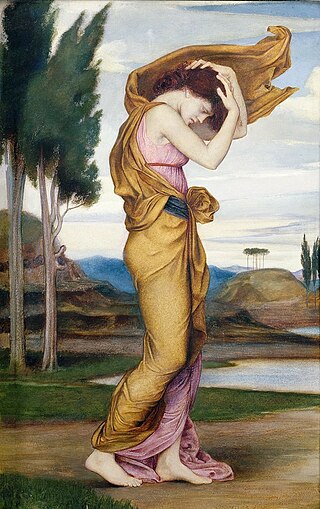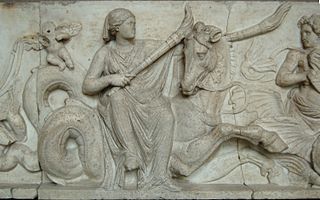Related Research Articles

Deianira, Deïanira, or Deianeira, also known as Dejanira, is a Calydonian princess in Greek mythology whose name translates as "man-destroyer" or "destroyer of her husband". She was the wife of Heracles and, in late Classical accounts, his unwitting murderer, killing him with the poisoned Shirt of Nessus. She is the main character in Sophocles' play Women of Trachis.
In Greek mythology, Clymenus may refer to multiple individuals:
The Minyades were three Orchomenian (Arcadian) princesses in Greek mythology. These sisters were protagonists of a myth about the perils of neglecting the worship of Dionysus.

In Greek mythology, an Oread or Orestiad is a mountain nymph. Oreads differ from each other according to their dwelling: the Idaeae were from Mount Ida, Peliades from Mount Pelion, etc. Myths associated the Oreads with Artemis, since the goddess, when she went out hunting, preferred mountains and rocky precipices.

In Greek mythology, Oeneus was a Calydonian king. He introduced wine-making to Aetolia, which he learned from Dionysus and the first who received a vine-plant from the same god.
In Greek mythology, Porthaon, sometimes referred to as Parthaon or Portheus, was a king of Calydon and son of Agenor or Ares by Epicaste and thus brother of Demonice and possibly Thestius.

Althaea or Althea was the queen of Calydon in Greek mythology.

In Greek mythology, the name Melanippe referred to several different people:
In Greek mythology, Pisidice or Peisidice was one of the following individuals:

Doris, in Greek mythology, was a sea goddess. She was one of the 3,000 Oceanids, daughters of the Titans Oceanus and Tethys.
In Greek mythology, the Teumessian fox, sometimes called the Teumessian vixen, was an enormous fox that was destined never to be caught.
In Greek mythology, Praxithea was a name attributed to five women.
In Greek mythology, Gorge may refer to:
In Greek mythology, the name Caucon may refer to:
In Greek mythology, Eurymēdē may refer to the following characters:
In Greek mythology, Proetus, the son of Abas, was a king of Argos and Tiryns.
In Greek mythology, Agrius was a Calydonian prince as the son of King Porthaon and Euryte; he was the brother of Oeneus, Alcathous, Melas, Leucopeus, and Sterope.
In Greek mythology, Eupolemeia was a Phthian princess as daughter of King Myrmidon and possibly Peisidice, thus sister to Antiphus, Actor, Erysichthon, Dioplethes and Hiscilla. Eupolemeia consorted with Hermes and by him, she bore Aethalides near the streams of Amphrysus.
In Greek mythology, Dioplethes was a Phthian prince as son of King Myrmidon and possibly Peisidice, thus brother to Antiphus, Actor, Erysichthon, Eupolemeia and Hiscilla. In some accounts, he was the father of Perieres, King of Messenia.
In Greek mythology, Hiscilla was a Phthian princess as daughter of King Myrmidon and possibly Peisidice, thus sister of Antiphus, Actor, Dioplethes, Eupolemeia and probably Erysichthon who was otherwise known as her son by Triopas. By the latter, she also became the mother of Phorbas and Iphimedeia.
References
- Claudius Aelianus, On the Characteristics of Animals, translated by Alwyn Faber Scholfield (1884–1969), from Aelian, Characteristics of Animals, published in three volumes by Harvard/Heinemann, Loeb Classical Library, 1958. Online version at the Topos Text Project.
- Claudius Aelianus, De Natura Animalium, Latin translation by Friedrich Jacobs in the Frommann edition, Jena, 1832. Latin translation available at Bill Thayer's Web Site
- Claudius Aelianus, De Natura Animalium, Rudolf Hercher. Lipsiae, in aedibus B. G. Teubneri, 1864. Greek text available at the Perseus Digital Library.
- Antoninus Liberalis, The Metamorphoses of Antoninus Liberalis translated by Francis Celoria (Routledge 1992). Online version at the Topos Text Project.
- Athenaeus of Naucratis, The Deipnosophists or Banquet of the Learned. London. Henry G. Bohn, York Street, Covent Garden. 1854. Online version at the Perseus Digital Library.
- Athenaeus of Naucratis, Deipnosophistae. Kaibel. In Aedibus B.G. Teubneri. Lipsiae. 1887. Greek text available at the Perseus Digital Library.
- Gaius Julius Hyginus, Fabulae from The Myths of Hyginus translated and edited by Mary Grant. University of Kansas Publications in Humanistic Studies. Online version at the Topos Text Project.
- Pausanias, Description of Greece with an English Translation by W.H.S. Jones, Litt.D., and H.A. Ormerod, M.A., in 4 Volumes. Cambridge, MA, Harvard University Press; London, William Heinemann Ltd. 1918. ISBN 0-674-99328-4. Online version at the Perseus Digital Library
- Pausanias, Graeciae Descriptio.3 vols. Leipzig, Teubner. 1903. Greek text available at the Perseus Digital Library.
- Publius Ovidius Naso, Metamorphoses translated by Brookes More (1859–1942). Boston, Cornhill Publishing Co. 1922. Online version at the Perseus Digital Library.
- Publius Ovidius Naso, Metamorphoses. Hugo Magnus. Gotha (Germany). Friedr. Andr. Perthes. 1892. Latin text available at the Perseus Digital Library.
- Suida, Suda Encyclopedia translated by Ross Scaife, David Whitehead, William Hutton, Catharine Roth, Jennifer Benedict, Gregory Hays, Malcolm Heath Sean M. Redmond, Nicholas Fincher, Patrick Rourke, Elizabeth Vandiver, Raphael Finkel, Frederick Williams, Carl Widstrand, Robert Dyer, Joseph L. Rife, Oliver Phillips and many others. Online version at the Topos Text Project.


